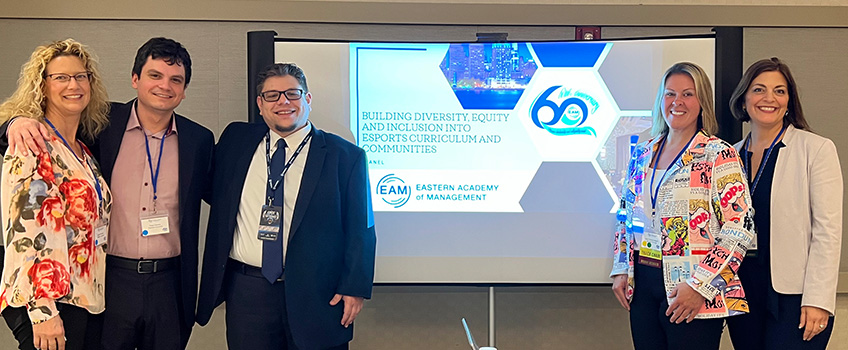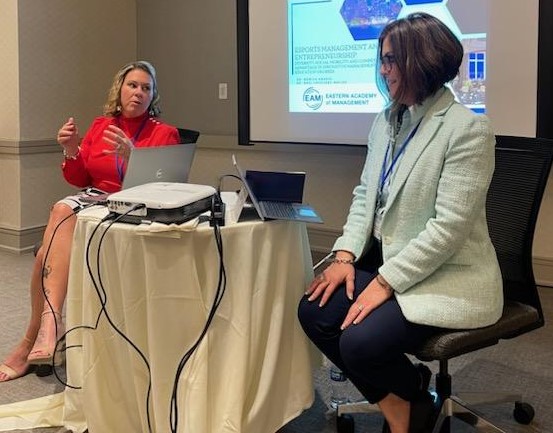Spotlight On: Faculty Focus on DEI in Esports at Conference

Stockton panelists from left to right, Jennifer Aarons, teaching specialist of Hospitality, Tourism and Event Management, and Esports Management; Petar Dobrev, assistant professor of Business Studies-Finance; Demetrios Roubos, Stockton's information security officer and esports program manager; Noel Criscione-Naylor, chair of Esports Management, interim chair of Hospitality, Tourism and Event Management, and associate professor and Monica Amadio, teaching specialist of Business Studies-Management.
Galloway, N.J. — Five Stockton faculty members presented at the 60th Annual Meeting of the Eastern Academy of Management (EAM), the regional division of the Academy of Management, held May 16-19 in Philadelphia. The jubilee anniversary of EAM focused on "Towards Justice and Equity in an Unequal World."
 The conference included tracks for conceptual, empirical papers, panels, symposia
and posters that undergo a rigorous double-blind review process. This year, Stockton
was strongly represented in various tracks and continues to pioneer in esports and
program development.
The conference included tracks for conceptual, empirical papers, panels, symposia
and posters that undergo a rigorous double-blind review process. This year, Stockton
was strongly represented in various tracks and continues to pioneer in esports and
program development.
Noel Criscione-Naylor, chair of Esports Management, interim chair of Hospitality, Tourism and Event Management, and associate professor, presented "Building Diversity, Equity, and Inclusion into Esports Curriculum and Communities" with colleagues Jennifer Aarons, teaching specialist of Hospitality, Tourism and Event Management, and Esports Management; Petar Dobrev, assistant professor of Business Studies-Finance, Monica Amadio, teaching specialist of Business Studies-Management; and Demetrios Roubos, Stockton's information security officer and esports program manager.
During their panel, they introduced business academics and administrators to the multiple perspectives surrounding DEI in esports from numerous perspectives, including the current state of esports and as a developing field of academic study, the esports ecosystem, curriculum, student programs and entrepreneurship. In addition, the team focused on opportunities to reframe esports DEI discourse and critically engage with industry development practices.
Both disciplines, prepared as academic degree programs, have the potential to develop profession-ready students with critical and transferable skills that will not only allow graduates to thrive in their specific industry niche but have the flexibility and access to opportunities across workforce ecosystems that surround these disciplines.
Aarons described the esports ecosystem, the segments within the ecosystem and aligned skill sets with each segment that promote social mobility. As a result, she provided insight into the curricular connections and career potential within the esports ecosystem space.
Dobrev offered guidance on creating an interdisciplinary esports curriculum for an institution of higher education, leveraging an institution's strengths and existing synergies with existing courses within the realm of esports. He also encouraged academics to create a plan concerning the long-term development of DEI considerations.
Amadio discussed the connection between entrepreneurship in esports and the value of diversity to provide insights from multiple perspectives, highlighting not only the development of the new B.S. in Esports Management but the current work being done in the School of Business to develop a program focused on Entrepreneurship.
Roubos shared strategies for DEI in running esports student organizations and leagues and the actions he has taken to build an inclusive and positive esports environment.
In a second paper presentation, Criscione-Naylor and Amadio presented "Esports Management and Entrepreneurship: Diversity, Social Mobility, and Competitive Advantage in Innovative management education Degrees." They focused on declining enrollment concerns for colleges and universities linked to cost, workforce demands and competition from alternative educational pathways. Within this context, the administration has challenged educators to identify programs and enrollment strategies in Management Education, particularly in emerging areas that offer opportunities for innovation, upskilling and reskilling, convenience, and supporting social mobility through increased access and diversity of applicants.
Two programs that have gained attention include Esports Management and Entrepreneurship. Criscione-Naylor and Amadio explored these emergent degree programs and critically evaluated the academic fields, their links to diversity and equity, barriers to program development, and synergies between the two. They also shared insights into higher education program strategies for educators and administrators alike.
"Both disciplines, prepared as academic degree programs, have the potential to develop profession-ready students with critical and transferable skills that will not only allow graduates to thrive in their specific industry niche but have the flexibility and access to opportunities across workforce ecosystems that surround these disciplines," Criscione-Naylor concluded.
Criscione-Naylor became vice president of Programs for Eastern Academy of Management, and will be bringing the next conference to Providence, Rhode Island.
Want to take a deeper dive into Esports at Stockton University?
Reported by Mandee McCullough
Photos submitted


